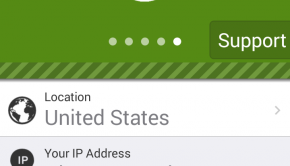Can Your IP Address be Traced If You’re Using a Proxy Server?
Can IP Address be traced? The short answer is, yes. Most people assume that only your ISP can tell what your IP address is, and they’re wrong. In fact, anyone with a little know-how can figure out, view, and “capture” your IP.

However, what if you’re using a proxy server? Can IP address be traced then? Well, let’s find out, shall we?
What Is a Proxy?
A proxy server is basically a gateway between you and the internet. It is an intermediary server that separates end users from the sites they visit. Proxies provide varying levels of security, functionality, and privacy, depending on your needs, use case, or business policy.
If you are on a proxy server, web traffic flows via the proxy on its way to the address which you requested. This request comes back through the same proxy, and the proxy server then forwards the data it received from the site to you. Proxy servers provide a high level of privacy and keep you and your internal network protected.
How Does a Proxy Work?
You can think of a proxy server as a computer on the web with its own IP address that your computer recognizes. When you send out a request, your web request goes to the proxy server initially, then the server makes the request on your behalf, collecting the response from the webserver and forwarding you the page data so that you can view the web page in your browser.
A proxy server is able to change your IP so that the webserver is unable to locate your current location. Also, it can encrypt your data to make it unreadable in transit. Finally, proxies can block access to specific web pages, depending on your IP address.
What Is an ISP?
An Internet Service Provider (ISP), as the name suggests, is a company that provides individuals and companies with internet access and other services like virtual hosting and website building. Data can be transmitted using several different technologies, including DSL, dial-up, wireless, cable modem, or dedicated high-speed interconnects.
ISPs are also referred to as online service providers and IAPs (Internet access providers). You must need an ISP, cable company, or any other company that provides the required hardware to connect to the internet.
What Information is Available to ISPs?
Despite the privacy and security precautions you take, there’s someone who can see each and everything you do online: your ISP.
ISPs can track things, such as the websites you visit, how often you visit them, how many hours you spend on them, the device you’re using, the content you watch, your emails, passwords, geographic location, download history, Bitcoin transactions, whether you’re torrenting, etc. Based on where you are in the world, such information can be used for a variety of purposes. This includes building a customer profile for sale to third-party ad companies, or for imposing web censorship on behalf of the government.
No matter what you do online, if you don’t encrypt your web traffic, your ISP can potentially see all of it. This is where proxy servers come in handy.
Proxy: Your Ultimate Solution to Online Privacy
As already mentioned, proxies work like a charm when it comes to hiding your identity online. But, can your ISP trace IP address if you use a proxy?
Luckily, a proxy server can encrypt all of the web traffic running to and from your computer and make it unreadable to your ISP and anyone spying on your activity. Here’s why we recommend using a proxy:
Your IP Is Hidden
By using a proxy server, the site you access won’t be able to log your actual IP address. Instead, it will log the proxy server’s address, meaning you’re anonymous when browsing the internet.
You Can Access Restricted or Geo-Blocked Content
A lot of the content on the internet is hidden behind geo-restrictions—this is mostly due to copyright and network regulations. However, since proxies hide your IP address, sites aren’t able to stop you from accessing them on your country. A perfect example would be using a proxy server to access Netflix US outside the US region.
Also, you can use a proxy to bypass network restrictions at school or work—restrictions that would otherwise prevent you from accessing various online content.
Malicious Sites Can Be Filtered Out
If you’re a business and want to protect your sensitive company data and information, using a proxy server can be extremely beneficial. The admin can block users from accessing malicious sites.
While this may sound counterintuitive at first, but think about it this way: If the admin knows a website has phishing or malware links, they can prevent proxy users from unknowingly or accidentally visiting it.
Load Times Can Be Reduced
Proxy servers can cache data easily. Once they access particular pages, they tend to store them for later. Therefore, when a cached page is requested, the proxy server can display it faster to you.
However, note that this will only happen if the proxy you’re using has the web page requested in its local cache already.
Other Proxy Use Case
Not many people are aware of it, but proxies are harnessed by businesses worldwide that practice web scraping. Web scraping refers to extracting publicly available data from the web to gather actionable insights that allows to shape companies policies. Of course, this is another subject, but if sounds of some interest to you check out Oxylabs’ blog post to get familiarized with it more.
Wrapping Up
Can IP address be traced?
Well, as you can see, your IP address can indeed be traced. But if you use a proxy server, you can protect your IP from hackers and prying eyes.
So, what are your thoughts regarding all this? Can IP address be traced if you’re using a proxy? Leave a comment below and let us know if you have any queries or suggestions.
















